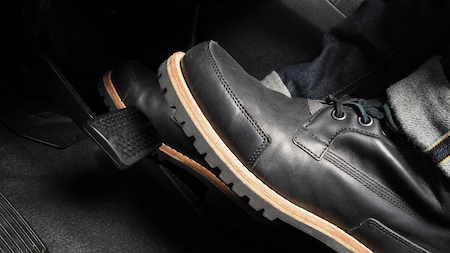You tap on the brake. Something’s not right. It shakes and shimmies. The brake pedal vibration is unnerving.
Brake pedal vibration is not only uncomfortable, but also a sign of potential safety concerns.
Drivers often describe it in different ways:
“It feels like a pulsating or throbbing sensation underneath my foot as I apply the brakes.”
“It’s a pronounced vibration every time I press down on the pedal.”
“It’s not just the brake pedal, I feel it in the steering wheel tool. The whole car shakes and feels like I might lose control.”
Some drivers even state the vibration is problematic, but the noise gets them. It’s a squeaking or grinding noise, and it worsens over time.
What can you do?
How the Brake Pedal Works within the Brake System
The brake system seems simple: tap the brakes, and the car stops. It’s a little more complex than that.
When you press the brake pedal, you initiate a chain reaction that slows down or stops your car.
It begins with the driver’s input—when you press the brake pedal, you exert force on it with your foot. This force triggers the master cylinder, which takes the force applied by your foot and transforms it into hydraulic pressure. This hydraulic pressure is subsequently moved through the brake fluid to reach the brake calipers (in disc brake systems) or wheel cylinders (in drum brake systems).
These brake calipers or wheel cylinders act as crucial intermediaries, engaging with the brake pads in disc brakes or brake shoes in drum brakes. They exert pressure on these friction materials, causing them to make contact with the brake rotors (in disc brakes) or brake drums (in drum brakes). As a result of this contact, friction is generated, and this frictional force effectively slows down or brings your vehicle to a complete stop.
To think it all starts with a tap on the brake pedal …
How Brake Vibration Occurs
Brake pedal vibration can be a troubling experience, and it usually indicates an issue somewhere in your vehicle’s braking system. The most common culprit is an uneven distribution of forces during braking. This can result from a variety of sources, including:
Uneven Brake Rotors – When the brake rotors (discs) are unevenly worn or warped due to excessive heat, it can lead to brake pedal vibration. This uneven surface causes the brake pads to make inconsistent contact during braking.
Poor Brake Pad Condition – Worn-out or improperly installed brake pads can create vibrations. When the pads aren’t sitting squarely against the rotor surface, it can cause pulsation in the pedal.
Alignment Issues – Poor wheel alignment can cause uneven tire wear, which, in turn, can lead to brake pedal vibration. Proper alignment ensures even distribution of braking forces.
Suspension Issues – A compromised suspension system can affect the vehicle’s ability to maintain a stable posture during braking. This can result in uneven braking forces and pedal vibration.
Worn-Out Brake Components – Over time, various brake components such as calipers, wheel cylinders, and brake hoses can deteriorate or become damaged. When this happens, it can affect the overall brake system’s performance and lead to pedal vibration.
How to Fix Brake Pedal Vibration
Think you’re experiencing brake pedal vibration? Recognition is the start of the solution.
Bring it in, and we’ll get to the root cause, and fix it to bring your vehicle back to working condition. In most cases, a vibration usually requires one of the following maintenance items:
Brake Rotor Resurfacing or Replacement – If your brake rotors are unevenly worn or warped, consider having them resurfaced or replaced. This will ensure a smooth and even contact surface for the brake pads.
Brake Pad Replacement – If your brake pads are worn out or improperly installed, replace them with high-quality pads compatible with your vehicle’s specifications. Ensure that they are installed correctly to provide even contact with the rotors.
Alignment Check and Correction – Regularly check and adjust your vehicle’s wheel alignment to prevent uneven tire wear and subsequent brake pedal vibration.
Suspension Inspection and Repairs – Address any suspension issues promptly to maintain stability during braking. This can involve repairing or replacing worn-out suspension components.
Comprehensive Brake System Inspection – Periodically inspect your entire brake system by a qualified mechanic. This includes checking calipers, wheel cylinders, brake hoses, and other brake components for wear and damage.
How to Avoid Brake Pedal Vibration
Like other systems in your car, prevention is your best strategy for dealing with potential brake problems. To avoid brake pedal vibration, here are some proactive steps you can take:
Avoid Aggressive Braking – Try to avoid slamming on the brakes unnecessarily. Gradual and smooth braking reduces heat buildup and wear on brake components.
Use High-Quality Brake Parts – Invest in high-quality brake pads, rotors, and other brake components that meet or exceed your vehicle’s specifications. Quality parts tend to perform better and last longer.
Visit a Brake Specialist Regularly – Schedule regular brake inspections with a qualified brake specialist or mechanic. They can catch and address potential issues before they lead to pedal vibration or more severe brake problems.
Final words
Knowing more about brake pedal vibration and how your brake system works can make you more aware of potential problems early in the cycle. Instead of waiting for more damage to occur, you can bring your car in for maintenance and stop potential problems in their tracks.
It’s important to note that brake pedal vibration is abnormal and usually indicates an issue within the braking system. Ignoring it can lead to safety concerns and further damage to brake components. If you experience brake pedal vibration, it’s advisable to have your vehicle inspected by a qualified mechanic to diagnose and address the underlying problem promptly.
Brake pedal vibration can be unsettling. Understanding its sources and following the recommended solutions can help you maintain a safe and comfortable driving experience.
How can we help you?

